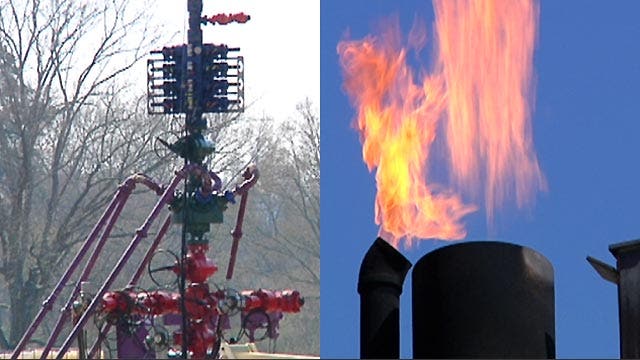Fracking Expands Throughout Southern U.S.
Gillsburg, Mississippi -- population 25 -- used to be filled with peace and quiet, but not so much anymore.
Now energy companies are flocking into small towns in Mississippi and Louisiana to search for big oil.
"There's supposed to be oil here. They call this the hot spot," said land owner Max Lawson.
Lawson is one of many residents leasing his land to energy companies Encana and Goodrich Petroleum. They are using hydraulic fracturing techniques, also known as "fracking," to extract oil and natural gas two miles below the surface in what is called the Tuscaloosa Marine Shale.
According to a Louisiana State University study, the Tuscaloosa Marine Shale is predicted to hold seven billion barrels of oil.
Lawson believes fracking on U.S. soil brings the country closer to energy independence.
"We don't have to be dependent on foreign oil," said Lawson.
But fracking has become controversial in recent years. According to the Environmental Protection Agency, some of the risks when fracking include ground water contamination and air pollution.
"It really interests me, I do a lot of research on it," said business owner Max Lawson Jr. Many residents living around the drill sites above the Tuscaloosa Marine Shale are forming opinions about the situation, too.
"There's a risk, an environmental risk. We don't want it to hurt the environment," said Lawson Jr.
Encana spokesperson Doug Hock says the company's work is done with safety in mind.
"While there certainly are impacts and it needs to be done very carefully, it can be done carefully. And it's done that way, every day," said Hock.
Although the environmental impact of fracking is debatable, local land owners say the community's economy is benefiting from fracking.
"Fracking is working. They are getting better at it every day, and it helps our economy. It's keeping the dollars in the United States," said land owner Rhett Anderson.
Anderson told FOX News one of the oil well sites on his property is producing about 100 barrels of oil every day. Anderson also said the same well was producing 1,100 barrels of oil every day during its peak production two years ago.
Hock said Encana plans to spend $125 million to $150 million in the Tuscaloosa Marine Shale.
They will be running between 9 to 12 wells over the course of 2014.




















